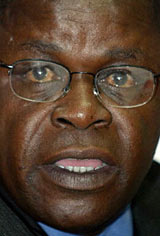An undignified exit looms
Martin Williamson looks at the events which have led to Peter Chingoka being backed into a corner
Martin Williamson
10-Nov-2005
|
|

|
But less than four days later, the whole deck of cards is close to collapse. It appeared that many inside Zimbabwe cricket had had enough, and despite repeated attacks on key protagonists by the state-controlled media, the rebellion just wouldn't die down. Taking on players or the provinces was sustainable. Taking on both - and the players' open dismay with the board has never been so obvious - was too much to ask.
The Zimbabwe Cricket board has used all the tricks in its book. In September, the players issued an open statement denouncing its tactics as those of a "bully" - ZC responded by barring all journalists from its AGM the next day, a meeting which was rushed and undemocratic according to those who did manage to get inside.
In October, more dire on-field setbacks brought the situation to a head. Sides were sent to South Africa and India to play in domestic competitions - both were trounced, and by the end opponents had taken to fielding second-string teams and were still winning. At home, Kenya beat a side nominally labeled as Zimbabwe A, but full-strength in all but name, in three games out of three.
The provincial chairmen had had enough. On October 21 they met and demanded change. The ZC board acted swiftly, denouncing the meeting as being unrepresentative, and dispatching their own supporters to the provinces to try to overthrow the troublesome chairmen. Inevitably, the race card was played with gusto, but whereas the players' revolt in 2004 had been dismissed as being by white cricketers, this time there was no such divide to mask the issues. Those lined up against ZC were from across the racial spectrum. That didn't stop the board throwing mud in every direction, but this time little of it stuck.
Then came the news that the board was about to create five new provinces. It claimed it was a democratic move, but most saw it for what it was - a desperate attempt to gain the board enough votes from hand-picked appointees to survive. The announcement that Temba Mliswa, one of Zimbabwe's most controversial characters and a pro-Mugabe activist, was the first such appointment just confirmed what everyone suspected.
But it's the ZC finances that are at the heart of the dispute. Critics claim that little money has found its way through to the provinces, and accuse the board of paying their own officials massively-inflated salaries as well as other perks. The chairmen's letter detailed numerous areas of concern.
Those few journalists brave enough to continue to delve in a country where freedom of speech is almost non-existent, talk of being intimidated and threatened. One reporter who made an enquiry to the board found himself called back by a senior official from the Ministry of Information who warned him to back off. The threats made against Tatenda Taibu, allegedly by someone with links to the board and the ruling Zanu-PF party, underline how nasty this has all become.
In the last week, rumours started spreading that the local police were sitting up and taking notice and that the chairmen's damning dossier had attracted attention in high places. And in Zimbabwe, you can get away with just about anything as long as you don't upset people near the top of the food chain.
That Chingoka, Bvute and other senior ZC officials were picked up by the country's anti-corruption police for questioning is a sign that the authorities are becoming interested. If ZC loses the patronage of the government, the chances of its senior officials surviving are slim.
A senior administrator from outside Zimbabwe told me earlier this week that the feeling was that Chingoka had lost control and support, and the aim now "was to enable him to make a dignified exit." The events of the last few days might have robbed him of even that opportunity.
Martin Williamson is managing editor of Cricinfo